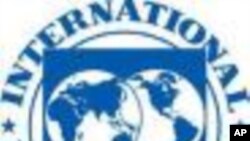The International Monetary Fund says Zimbabwe’s economic recovery is at risk from rising political tension in the government of national unity amid increasingly strident calls for elections next year. The international lender of last resort said political uncertainty could endanger projections of 7 to 7.5 percent growth next year.
The IMF said output remained robust in the first half of 2010 due to improved policies and favorable external factors such as a stronger South African rand - a plus for Zimbabwean exports - and weather supporting agriculture.
But the letter, extracts from which were obtained by VOA, said that “risks are slanted to the downside” with the political situation doubtful, the country's external position precarious and the financial sector vulnerable.
The letter, summarizing the findings of an IMF team in Harare recently for so-called Article IV consultations on economic policy and performance, urged significant further reforms at the Reserve Bank of Zimbabwe.
Economic commentator Bekithemba Mhlanga told VOA Studio 7 reporter Gibbs Dube that the government should take seriously the IMF’s warning on the consequences of political uncertainty.
The IMF also issued a statement Monday attributed to the leader of the IMF mission, Vitaliy Kramarenko, stressing that political stability is crucial to consolidating gains in macroeconomic performance. Kramarenko said it is important to build consensus on a strong medium-term agenda focused on prudent macroeconomic policies and a comprehensive package of reform.
This will in turn “sustain the economic recovery, spread its benefits to a larger share of the population, and reduce significant external and financial vulnerabilities,” Kramarenko was quoted as saying.
The statement offered a favorable fiscal view saying the budget would be in surplus in 2010, urging that windfalls be directed to essential services and improving the quality of life. “Reorienting the budget expenditures to infrastructure and social needs would solidify the recovery and improve living conditions of ordinary Zimbabweans.”
Elsewhere, Essar Energy Holdings of Mauritius has been selected to take a strategic stake in the long-troubled Zimbabwe Iron and Steel Company or ZiscoSteel, Industry and Commerce Minister Welshman Ncube said.
Ncube told VOA Studio 7 reporter Gibbs Dube that the three unity government principals selected the firm from a short list of three companies to acquire a stakeholding of between 51 and 60 percent in Ziscosteel. The company is expected to inject substantial new capital into ZiscoSteel once the deal is closed.
Essar Energy Holdings edged out Jindal Steel and Power of India and Sino-Zimbabwe of China.
The IMF said output remained robust in the first half of 2010 due to improved policies and favorable external factors such as a stronger South African rand - a plus for exports - and weather that supported the agricultural sector





